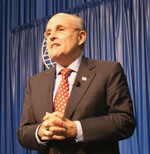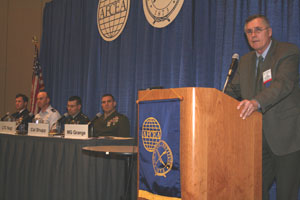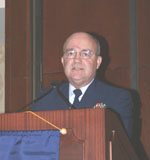Wednesday, January 31, 2007
SIGNAL’s Online Show Daily
West 2007
Day 1
Quote of the Day:
“Our domestic United States is now a battleground.”
—Former New York City Mayor Rudolph Giuliani.
 |
| Former New York City Mayor Rudolph Giuliani gives the kickoff address at West 2007. |
Giuliani told a standing-room-only crowd that the Global War on Terrorism has been ongoing for many years prior to the September 11, 2001 attacks on his home city. This particular enemy struck at the World Trade Center in 1993, he pointed out, and that only represented the first attack on U.S. soil. Terrorist attacks on the West date back to the 1970s, and he cited the German government’s release of the Munich Olympic massacre terrorists and Italy’s later release of the murderers of American Achille Lauro cruise ship passenger Leon Kinghoffer as “empowering the terrorists.”
Until the 9/11 attacks, the West was entirely on the defensive, treating terrorism as a crime and reacting only symbolically—if at all—to terrorist acts after the fact. But after the World Trade Center was destroyed, the United States took the offensive and changed the U.S. approach to terrorism. The country must continue to take the fight to the terrorists to prevent them from regaining the initiative, he stated.
Giuliani addressed the Iraq War, saying that if the United States withdraws now, the country will put itself in a more dangerous position to be attacked by terrorists. Mistakes have been made, he stated, but no war ever has been conducted without the winning side having made serious mistakes. He related how President Abraham Lincoln saw the Union Army lose every battle of the first three years of the Civil War, but his optimism and vision prevailed through to a victory two years later. The Civil War “went a lot more wrong” than Iraq, Giuliani analogized, and he offered his views on how important leadership is to prevailing in today’s war.
Difficult endeavors require trial and error, he declared, and he warned against shying away from an effort just because it is difficult. One key quality of leadership is to have a set of beliefs or a plan. Another is to be optimistic and to think success. Many people who look at Iraq today are pessimists who see only the setbacks and don’t acknowledge the advances that have taken place, he charged. President Lincoln may have been clinically depressed, but he maintained his optimism about prevailing in the Civil War—although Giuliani offered “thank goodness for Lincoln they didn’t have CNN.”
That optimism is key because the terrorists hope to break the U.S. national will, the former mayor stated. They believe that Americans are weak and that the key to the terrorists’ victory is for the American people to lose heart over the long haul. “It is up to us to prove them wrong,” Giuliani declared.
Right after Giuliani’s address came the show’s first panel, which focused on operational lessons learned and solutions for the Iraq War. Panel moderator Maj. Gen. David L. Grange, USA (Ret.), president and chief executive officer, McCormick Tribune Foundation, stated that the new troop surge may be the last chance for the United States to produce an outcome favorable to the American people.
Col. Michael A. Shupp, USMC, chief of staff for the Joint IED Defeat Organization and a former commander of a Marine regimental combat team and a Marine regiment, related how Iraqi forces acquitted themselves well fighting alongside Marines. Stories of the Iraqis’ bravery have not been told here, he said.
Echoing Col. Shupp’s stories about Iraqi forces’ heroism, Col. John Nagl, USA, with the 1-34 Armor Battalion in the 1st Division, described how finding the insurgents is harder than fighting them. The solution to defeating the insurgency is not more power but better intelligence, he offered.
Brig. Gen. (Sel.) Michael Callan, USAF, commander, Air Force Special Operations Forces, gave an Air Force perspective to the fight in Iraq. He said that among the key lessons learned is that more simple command and control architectures are the ones that enable ground commanders to bring maximum air power the bear.
Cmdr. Steve Wisotzki, USN, former commander of SEAL Team 1, outlined how Navy SEALs conducted operations in Al Anbar province, which he described as the most dangerous in Iraq. He noted that having women in special operations forces gave those forces access to women in towns, which proved very helpful. Al Qaida largely has been run out of Al Anbar, and “the prognosis is good” that they won’t regain their previous position. Non-kinetic means now make the most effective operations, he added.
 |
| Panelists discussing the Iraq War are (r to l) panel moderator Maj. Gen. David L. Grange, USA (Ret.); Col. Michael A. Shupp, USMC; Lt. Col. John Nagl, USA; Brig. Gen. (Sel.) Michael Callan, USAF; and Cmdr. Steve Wisotzki, USN. |
Col. Shupp lauded the work of embedded media in covering the troops, although these reporters often share the military’s frustrations about how their stories are edited back home. Col. Nagle seconded his remarks, but Gen. Callan stated that not all reporting from the front has been good and that positive stories are not always being told back home.
Gen. Grange offered that many reporters don’t get to choose what is put on television or how their print stories are edited. He said that the producers are the ones who decide how the field journalists’ reports are presented, if at all, and those producers may be acting on their own personal opinions.
A member of the audience who described himself as a member of the media but didn’t identify himself took umbrage at Gen. Grange’s comments. He stood up and angrily condemned the general for accusing the media of bias, especially as so many reporters have given their lives covering the war. Gen. Grange apologized to the man for giving that impression, but he defended his statement that not all field reporters covering the Iraq War can control how their reportage is presented.
Cdr. Wisotzki added that the U.S. media is only part of the war coverage. Mideast media, particularly outlets such as Al Jazzeera, are carrying the coverage for Arabs in that region. Their viewers do not trust U.S. media sources, so the United States must put more energy into working with Arab media.
The day was capped off by an evening address giving the U.S. Coast Guard’s perspective. Vice Adm. Charles D. Wurster, USCG, commander, Coast Guard Pacific Area, described the Coast Guard’s ongoing activities in support of both homeland defense and homeland security. These include force transformation and modernization, interoperability efforts with domestic government organizations and complex international agreements.
“We’ve only scratched the surface of border security,” he declared.
 |
| Vice Adm. Charles D. Wurster, USCG, commander, Coast Guard Pacific Area, tells the audience at the honors dinner about the Coast Guard’s multifaceted challenges and programs. |
Maritime regimes, maritime domain awareness and maritime operations will make up those factors. In the same manner that the Department of Homeland Security has its secure border initiative for land, Adm. Wurster called for a “secure border initiative—wet.” The nation needs a single credentialing system to serve as a screening tool for vessels entering U.S. waters, he added.
The Coast Guard is internationally involved both through global agreements and through bilateral pacts. The IMO recently established the protocols for 300-gross-ton ships to be identified at sea. Bilateral agreements with Ecuador, Columbia and Mexico have helped counterdrug operations. When drug smuggling becomes the fundraising activity of choice for terrorists, these agreements will play important roles in the Global War on Terrorism, the admiral noted.
The Coast Guard’s modernization efforts focus on a “strategic triad” of shore-based forces, mobile forces and deployable forces. The centerpiece is its DeepWater program, which Adm. Wurster described as “the eyes and ears” for the maritime domain. He conceded that the Coast Guard has had difficulty in getting the results its wants with that program, but the commandant is addressing the problem. This effort takes the Coast Guard’s restructuring into account, he added.
If DeepWater is the Coast Guard’s eyes and ears out at sea, its command centers serve as the eyes and ears of U.S. coastal waterways, the admiral offered. Three of them are operational in Hampton Roads, Virginia; Charleston, South Carolina; and San Diego. However, their common operational picture must grow to include state and local agencies, he said.
—Scheduled for Thursday at West 2007: Speeches by Dave Wennergren, deputy assistant secretary of defense for information management and technology, and Adm. James G. Stavridis, USN, commander of the U.S. Southern Command; along with panel discussions on procuring and networking the 1,000-ship navy.




Comments